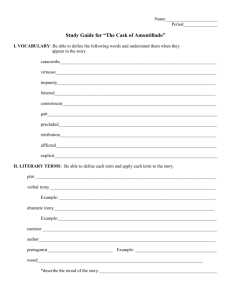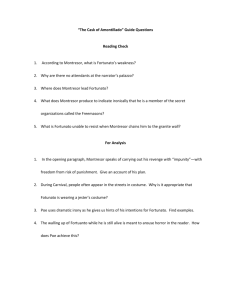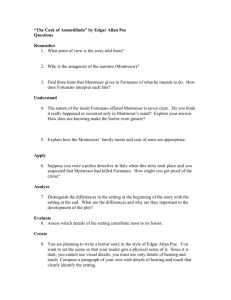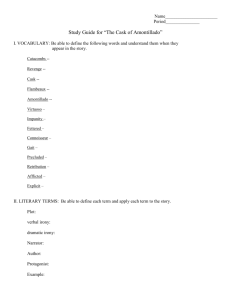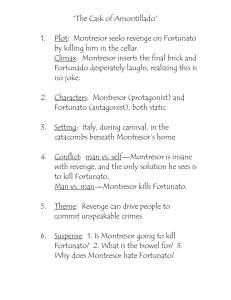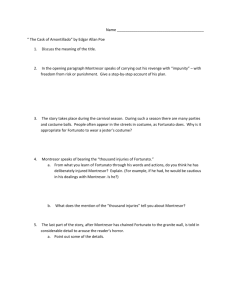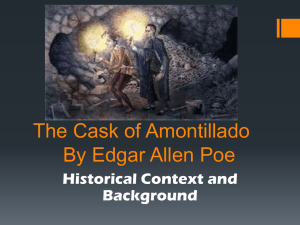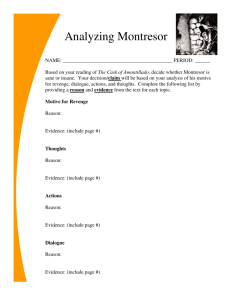Cask of Amontillado - Honors English 9 with Mrs. Xenakis
advertisement
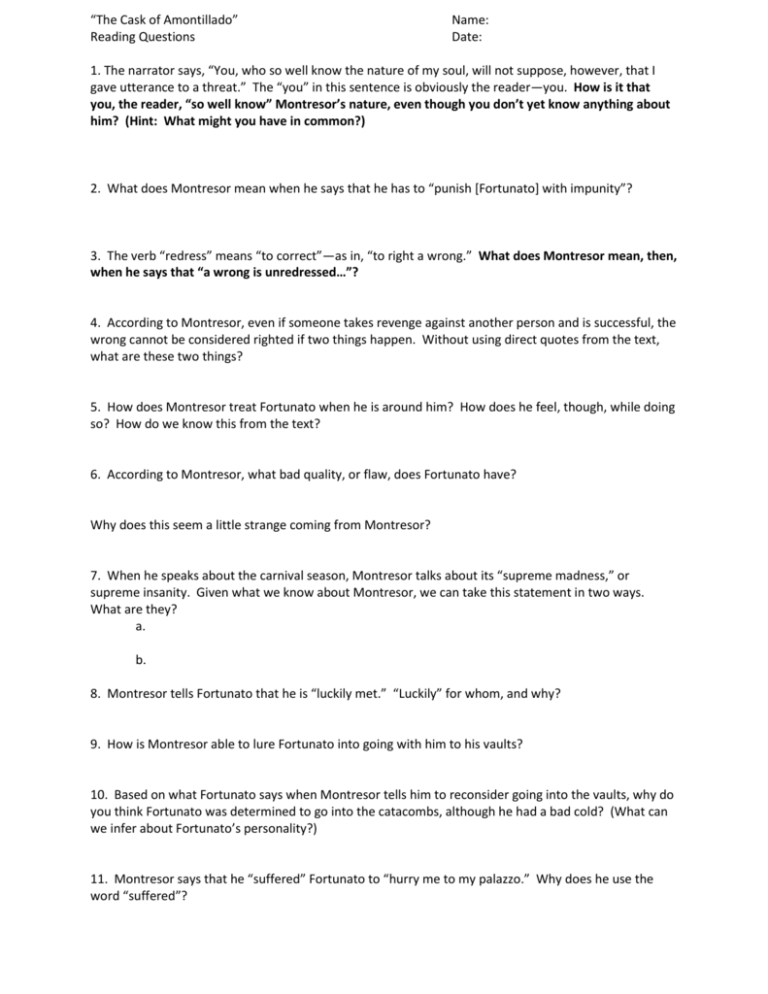
“The Cask of Amontillado” Reading Questions Name: Date: 1. The narrator says, “You, who so well know the nature of my soul, will not suppose, however, that I gave utterance to a threat.” The “you” in this sentence is obviously the reader—you. How is it that you, the reader, “so well know” Montresor’s nature, even though you don’t yet know anything about him? (Hint: What might you have in common?) 2. What does Montresor mean when he says that he has to “punish [Fortunato] with impunity”? 3. The verb “redress” means “to correct”—as in, “to right a wrong.” What does Montresor mean, then, when he says that “a wrong is unredressed…”? 4. According to Montresor, even if someone takes revenge against another person and is successful, the wrong cannot be considered righted if two things happen. Without using direct quotes from the text, what are these two things? 5. How does Montresor treat Fortunato when he is around him? How does he feel, though, while doing so? How do we know this from the text? 6. According to Montresor, what bad quality, or flaw, does Fortunato have? Why does this seem a little strange coming from Montresor? 7. When he speaks about the carnival season, Montresor talks about its “supreme madness,” or supreme insanity. Given what we know about Montresor, we can take this statement in two ways. What are they? a. b. 8. Montresor tells Fortunato that he is “luckily met.” “Luckily” for whom, and why? 9. How is Montresor able to lure Fortunato into going with him to his vaults? 10. Based on what Fortunato says when Montresor tells him to reconsider going into the vaults, why do you think Fortunato was determined to go into the catacombs, although he had a bad cold? (What can we infer about Fortunato’s personality?) 11. Montresor says that he “suffered” Fortunato to “hurry me to my palazzo.” Why does he use the word “suffered”? 12. Earlier in the story, Montresor met up with Fortunato and told him that he was “luckily met.” Luck, however, implies that they met by chance or by coincidence. How does Montresor’s statement there to Fortunato become suspicious when we compare it to what Montresor now says about his servants and the reason that they are not home when he arrives there? 13. Give at least two examples from the text of Montresor showing concern for Fortunato’s health or safety. a. b. Do you think these concerns are genuine? (Before you answer, think back to what Montresor told us about revenge. In order to get revenge, what must the victim know?) Defend your response, based on the text. 14. Up to now, Montresor has tried to convince us that his motive is revenge. Yet, what he says to Fortunato after Fortunato’s coughing fit suggests another, more heinous motive. What is it? Defend your answer with a direct quote from Montresor’s comment. 15. What is ironic about the statement: “He again took my arm, and we proceeded”? 16. Describe, in modern-day English, Montresor’s coat of arms. Based on the story, explain the significance of this being the symbol for (a) Montresor and (b) his family. Translate Montresor’s family motto. 17. When Montresor grabs Fortunato by the arm above the elbow, why does Montresor describe his act as a “bold” move? What emotion do you think Montresor is feeling as he tells this part of the story? (Focus on his word choice.) 18. What are two possible definitions of the word “mason”? How does Montresor play with these definitions? 19. How does Montresor prevent Fortunato from being able to escape from the crypt? 20. What does Montresor do in response to Fortunato’s screams of terror? What does this again reveal about Montresor’s real reason for the murder? 21. Does Montresor feel any remorse for what he does to Fortunato? Defend your answer from the text.
